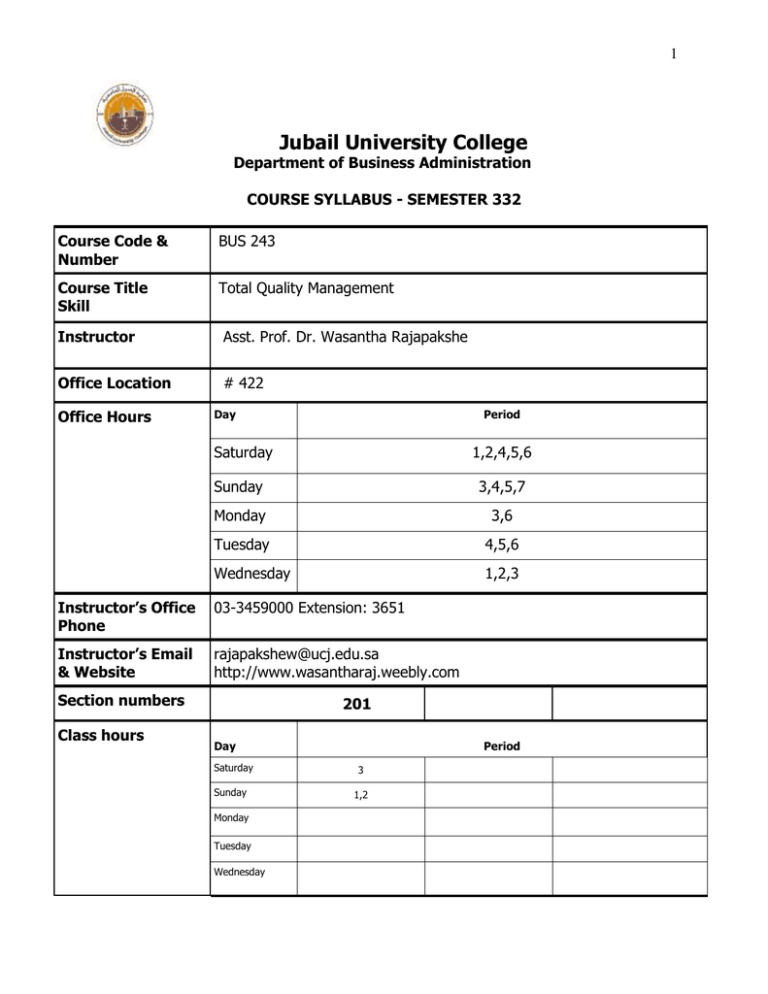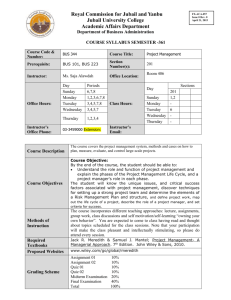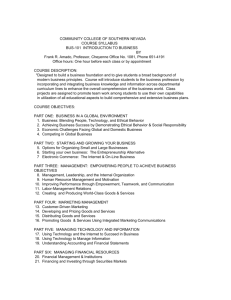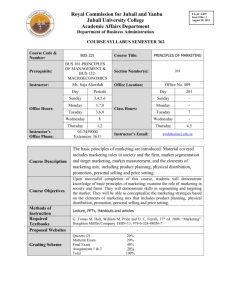File - Dr. Wasantha Rajapakshe
advertisement

1 Jubail University College Department of Business Administration COURSE SYLLABUS - SEMESTER 332 Course Code & Number BUS 243 Course Title Skill Total Quality Management Instructor Asst. Prof. Dr. Wasantha Rajapakshe Office Location # 422 Office Hours Day Period Saturday 1,2,4,5,6 Sunday 3,4,5,7 Monday 3,6 Tuesday 4,5,6 Wednesday 1,2,3 Instructor’s Office Phone 03-3459000 Extension: 3651 Instructor’s Email & Website rajapakshew@ucj.edu.sa http://www.wasantharaj.weebly.com Section numbers Class hours 201 Day Saturday Sunday Monday Tuesday Wednesday Period 3 1,2 2 Prerequisites BUS 101 Course Rationale The course provides students with fundamentals and contemporary knowledge of TQM, during which students develop skills needed for analyzing various models for organizational TQM implementation. The course also enhances students’ understanding and practice of TQM critical Soft and Hard factors concerned with the implementing of TQM. The course also explains how various gurus from America, Europe and Japan contributed towards TQM development Course Objectives This is an advanced management course but a required course for all business majors. This course reviews the fundamental principles and historical foundations of total quality and to promote high-performance management practices and foundation for understanding and applying Six Sigma. Students will acquire knowledge through the selected textbook and assigned reading materials (as well as material accessible through the web) and apply them to specific real world management situations. At the end of this course, students will be able: Understand continual improvement, customer satisfaction, process improvement and total organizational involvement; Understand both technical and philosophical issues surrounding quality management; Apply quantitative and qualitative tools and techniques in appropriate ways to investigate and ultimately resolve product or service quality concerns; and, Evaluate the use of TQM initiatives, tools, and techniques in an organization. Methods of Instruction Required Textbook Proposed Websites The course incorporates different teaching approaches: lecture, assignments, group work, class discussions and self motivation/self-learning “owning your own behavior”. You are expected to come to class having read and thought about topics scheduled for the class sessions. Note that your participation will make the class pleasant and intellectually stimulating, so please do attend every session. The Management and Control of Quality: 2011. 8th Edition. James R. Evans and William M. Lindsay, Thomson South-Western. ISBN: 13 978-0538-45260-1 http://www.cengage.com/international 3 Grading Scheme Assignment 01 Assignment 02 Quiz 01 Quiz 02 Midterm Examination Final Examination Total 10% 10% 10% 10% 20% 40% 100% Jubail University College Grading Scale Total Points Letter Grade Percentage + A 95-100% A 90-<95% B+ 85-<90% B 80-<85% C+ 75-<80% C 70-<75% D+ 65-<70% D 60-<65% F 0-<60% W Withdrawal WP Withdrawal while Pass WF Withdrawal while Fail DN Denial I Incomplete P Pass Grade Point 4.0 3.75 3.5 3.0 2.5 2.0 1.5 1.0 0.0 N/A N/A 0.0 0.0 N/A N/A Course Outline Week Topics & Activities Notes 1 Introduction to Quality The History and Importance of Quality Defining Quality Total Quality Chapter 1 2 Introduction to Quality Quality and Competitive Advantage Three Levels of quality Chapter 1 4 3 4 Quality and Personal Values Total Quality in Organizations Quality and System thinking Quality in Manufacturing Quality in Service Quality in Health Care Quality in Education Quality in small Business Quality in Public Sector Philosophies and Frameworks Quality Management Philosophies Chapter 2 Chapter 3 QUIZ 01 5 6 7 8 9 Philosophies and Frameworks Quality Management Awards Leadership and Strategic Planning Leadership for quality Leadership theory and practices Leadership and Strategic Planning Creating Leadership system Leadership and Strategic Planning in the Baldrige Criteria, ISO 9000, and Six Sigma Chapter 3 Chapter 4 Chapter 4 MID TERM EXAMINATION Focusing on Customers The Importance of customer satisfaction and loyalty Creating Satisfied Customers Identifying Customer Focusing on Customers Understanding Customer Needs Customer relationship management Measuring Customer Satisfaction High-Performance Workforce Management The evolution of workforce management Principles of engagement and motivation Designing High –performance work system Chapter 5 12 High-Performance Workforce Management Managing high-performance work system Sustaining High-performance work system Chapter 6 13 Process Management Business processes Process management framework Designing work processes Process control 10 11 Chapter5 Chapter 6 QUIZ 02 Chapter 7 5 14 15 16 17 18 Process Management Process improvement Process improvement methodologies Breakthrough improvement Performance Measurement The scope of performance measurement Designing effective performance measurement systems Analyzing and using performance data The cost of quality Performance Measurement Measuring the return on quality Managing information resources Knowledge management Measurement and Information management Chapter 7 Chapter 8 Chapter 8 FINAL EXAM FINAL EXAM Jubail University College Policies Attendance 1. Attending at punctual time: Present otherwise the student is absent. 2. Late attendance 0 < 5 minutes: is late 3. Late ≥ 5 minutes: is absent Notes: (i) Every 3 late are counted as 1 absent 3 (ii) Every 15 × total semester contact hours + 1 is DN Grading 1. Quality point: is the result of multiplying the credit hours by the grading points. 1. Semester GPA: is the result of dividing total quality points achieved in all courses at that semester by total graded credit hours of all courses in that semester. 2. Cumulative GPA in a semester: is the sum of total quality points achieved in all courses up to that semester divided by the total credit hours graded for all courses up to that semester Plagiarism & Cheating 1. Cheating is a serious offence and will be punished by the JUC. 2. Talking, looking at your colleagues’ exam papers or any other suspicious act is considered cheating during exam. 3. Student will fail the subject if caught cheating.





